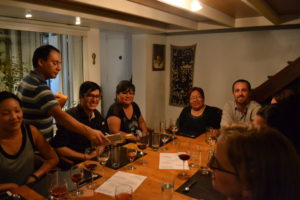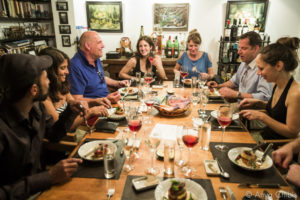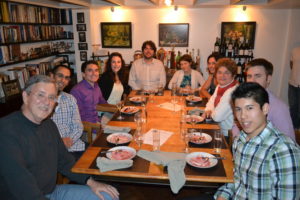Barrio Norte, Buenos Aires, Argentina
 What is a “closed door restaurant”?
What is a “closed door restaurant”?
I actually don’t like the term, because we’re not precisely a restaurant, though I understand why someone made up the term for it. It’s simply an in-home or other private space place to dine, generally only open to either “members” or people who have pre-reserved, sometimes only with recommendations. From that point on, they vary wildly.- In what way?
Everything, from the physical space, to the type of menu and service, the ambiance, the clientele – it’s as mixed up as “regular restaurants” are. Some people offer an a la carte menu, some only tasting or prix fixe menus, or even cocktail party style hors d’oeuvres. Wine, beer, liquor… or not. Cheap to expensive. Shabby to elegant. Professional waiters or not. I could keep going. - So how does Casa SaltShaker fit into all of that?
The quick summary: You’re joining a communal table with other guests who you don’t know, and we generally don’t either, and in a sense it’s not hosted, as we don’t join the table. It is in our home, a moderate-sized one-bedroom duplex in Recoleta, with a garden. Open to anyone — no membership required, no referral required. Dining is at a shared table for ten total. We offer a five-course tasting menu with paired wines. The ambiance is casual. The food is “sophisticated home cooking”. No smoking in the house, though out in the garden is fine. - What do you mean by “sophisticated home cooking”?
This isn’t intended to be a temple of haute cuisine. It’s me playing around in our home kitchen and making food that I enjoy and sharing it with others. Sometimes it’s elegant, sometimes it’s simple. I don’t have a pair of plating tweezers in my kitchen. I think that we serve very good food and most people seem to agree, but I’ve been around enough to know that not everyone has the same tastes.  And that doesn’t bother you?
And that doesn’t bother you?
In a fantasy world of some sort, everyone would like everything I cook. But this is reality. If I’m cooking food that everyone likes it’s likely that I’m cooking very basic, simple food and not taking any chances or experimenting, so that no one has anything to possibly object to. How boring that would be for everyone! Of course, it bothers me when people make negative comments in online forums or their blogs because I’m passionate about what we do. But in today’s world, the public sharing of opinions, especially negative ones, is a fact of life.- What sort of cuisine is it?
It changes every week, more or less based on a whim. I do tend towards fairly spicy, in either sense of the word – chilies or similar, or a mix of spices and herbs, all of which I use fairly liberally. Our focus is on Andean ingredients fused with a variety of global cuisines. Because there are so many good Argentine restaurants here in town, we rarely offer Argentine cuisine, though we have some places we recommend highly! - So how authentic or traditional is the cooking?
Well, it’s authentically me. If you’re looking for an experience that will transport you back to your grandmother’s kitchen in Verona or to recall your days of vacationing on the Maldive Islands, it’s probably not going to happen. I research and experiment with the ingredients and flavors of the globe, but rarely, in the end, do I follow a traditional recipe — it’s almost always “my food” influenced by those flavors. - How much of what you serve do you make, how much do you buy pre-made?
I understand where the question comes from, given a world of modern conveniences. However, pretty much, I make everything — bread, dough, pastry, pasta, some cheeses, sausages, ice creams or sorbets, etc. - Five courses sounds like a lot… or maybe, for a tasting menu, too little?
Generally each meal follows a similar pattern — an appetizer, a soup, a mid-course, a main course, and a dessert. It’s a real rarity that someone leaves hungry, and most people find themselves comfortably stuffed. We’re not doing little bite-sized courses like you might find on a ten-plate tasting menu. I grew up in a Jewish household and trained in Italian restaurants, enough said? Still, if you want more and we have something left, we’re not going to say no.  What about someone who is allergic to something, or on a special diet?
What about someone who is allergic to something, or on a special diet?
It simply depends. I always ask the person making the reservation if anyone in their party has allergies. After all, we don’t want to send someone to the hospital. And, as much as I’m able, I’ll accommodate those. It’s not always possible. I’m cooking five courses for ten people by myself, and it really just comes down to how integral an ingredient is to a dish. The same is true for someone on a special diet. If I know about it upfront, I’ll try to work with it or let you know I won’t, in which case you can make a decision of whether or not to still come that evening (at the communal dinners, we don’t offer vegetarian, gluten-free, or dairy-free options). It doesn’t mean that I have any interest in receiving a list of things that someone likes or dislikes to eat. I would say that given our cooking style, if you can’t or prefer not to eat tomatoes, garlic, onions and/or peppers/chilies, we’re probably not the place for you. Most important is not to wait until you’re here to tell me about it — it’s really too late. I don’t have a staff to turn to and say “whip up a vegan, keto, tasting menu” — yet, amazingly, at least once a month, something like that happens.- You’re kidding, right?
No. It usually goes hand in hand with someone not understanding what our setup is, part of the reason for this page. But it regularly happens that someone waits until they get here to tell us about an allergy or dietary restriction. At that point, most of the time, there’s often nothing I can do about it. Or even if I can put something together, it won’t be of the quality or with the care that I could if you tell me beforehand. There’s also a very strange, to me, tendency for people I say no to, to then try to shame me into complying, by invoking the name of one or another famous place where they ate where their dietary desires were granted. It doesn’t work. We’re not that place, and I’m not interested. We do what we do here. - How does the whole shared table thing work?
First, we ask everyone to come at the same time – around 8:15 in the evening, so that they have time to meet and chat. Depending on what I’m doing in the kitchen, I participate in that as much as I can, though it’s often difficult with last-minute preparations. We aim for everyone to sit down together around 8:45. We don’t assign seating; we leave it up to everyone to pick where and with whom they want to sit at the table. One note, if we have fewer than six people reserved for a dinner, we generally cancel it and refund the deposits for anyone who can’t attend a different evening. It’s a combination of both the social experience, and the financial viability for us. - Do you participate in the dinner and conversation?
We don’t sit down at the table to eat. I introduce the evening, a little about us and how the evening will proceed. I spend most of the dinner in the kitchen cooking. When I can break away from the stove, I do; I come out and chat. At the end of the night after dessert’s been served I stay out in the dining room chatting. Henry takes care of the table and diners, but, he doesn’t speak much English. He participates more if there are Spanish-speaking people. - Do you allow solo diners to attend?
This question always surprises me, along with similar ones when parties are “odd numbers”, like 3 people, or “can I come with someone who isn’t my spouse?” Of course, yes, that’s part of the whole reason for having a communal table. These aren’t couples-only evenings. - For Buenos Aires, your price seems a little steep…
Perhaps it is, but in nicer spots in town, not really these days, and we’re not remotely the most expensive restaurant around. Keep in mind that you’re getting a welcome cocktail, five courses of food, five paired wines, and filtered water or soda — all that for US$90. Plus, there’s no question that part of what you’re paying for is the atmosphere and experience — who knows who you’ll meet?  What do you mean?
What do you mean?
We’ve had people meet their next boy or girlfriend, or simply new friends to travel with or hang out with. We’ve had marriage proposals. We’ve had friends and former couples who’d lost track of each other and purely by chance found each other again here. As one of our regulars put it to me, she’d pay nearly as much to go to a “singles meet”, probably not meet anyone interesting, and the food would consist of coffee and store-bought pastries. For us, the social aspect of the evenings is the key to what we offer.- Why don’t you take reservations by phone, or from concierges or travel agents?
The first is easy: I’m not always at home in front of the computer, so if someone calls me on the phone, especially for a reservation that’s not the same week, I probably don’t know if I have availability for the date they’re asking about, and I’m not in a position to confirm their reservation. The second is more complicated: we used to, but we found that intermediaries in general don’t communicate what we’re all about well to potential diners and people arrive with expectations that are unrelated to reality. Plus, we don’t get information about things like food allergies and dietary restrictions, nor are we able to take a deposit — third parties are unlikely to be willing to pay on someone else’s behalf. And, too often, they make multiple reservations at different places and leave it up to the guest to decide when they arrive, resulting in last-minute cancellations or no-shows, a costly proposition for us. - So you require a deposit?
We started to do so in 2010. We didn’t use to, but as the whole closed-door-restaurant idea has started to become more mainstream, people have started to treat reservations like they often do regular restaurants — they cancel at last minute because they change their mind, or simply don’t show up. That never used to happen. So we now ask for a deposit that’s not refundable unless they cancel with at least a week’s notice — unless we can refill the seats. - What sort of cocktail and wines do you offer?
The cocktail is really more of a shot of something — usually a blend of a liquor with some sort of fruits or herbs or both. The wines, a mix. Usually, in progression: a sparkling, a white, a rose, a red, and a sweet wine. It changes from time to time to fit the menu. They’re not top-end wines, but they’re not bottom-shelf either. They generally range from 10000-20000 pesos per bottle, retail cost. - How much wine are you serving?
It’s five “tasting glasses”. We usually get 6-8 servings to a bottle, so a little more than a three ounce pour — which on the first glass might seem skimpy — but keep in mind that with five three-ounce pours, you’re drinking 17 ounces, or 2/3 of a bottle. And while it’s not intended to be an “all-you-can-drink” setup, if you want more of something, ask. As long as we haven’t finished off the bottles, you’re welcome to refills, no charge. - How do you select the wines?
Simply, experience. I taste a huge amount of wines at trade and consumer tastings. I try wines when I eat out. I’ve been a certified sommelier since 1993 and passed my Advanced Sommelier certification from the Court of Master Sommeliers in 1995, so at least I know my way around the wine shop. Still, even with experience, they’re my taste in local wines, that I think go with the food. Everyone has their own tastes, and not everyone will agree with me. - How about guests who want to bring their own wines?
The short answer is no. We tried it out the first few months we were open and it created too many problems. The guests who brought their wines were often demanding about the attention that their wines would receive, particularly if they brought something special. Some even brought their own glasses. Other guests often felt uncomfortable, either that they weren’t drinking something as good (or in some cases the reverse, when someone showed up with cheap supermarket or boxed wine). And, I wanted to offer the paired wine tasting as part of our experience. - And for diners who don’t drink wine? Are there other options?
It’s a wine dinner. And yes, we understand there are people who don’t drink alcohol, but, it’s a wine dinner. There’s no discount. With advance notice we can have something else available. Did I mention it’s a wine dinner? - What about experience cooking? You say it’s home cooking, but you’ve cooked in restaurants, yes?
Yes. I started cooking in a neighbor’s restaurant when I was 14. I cooked through high school and part of college. I took time off to try out other things, but after moving to NYC and deciding that grad school wasn’t for me, I went back to cooking. I also went back to school for it, at Peter Kump’s Cooking School (now the Institute of Culinary Education), and constantly take classes and/or work with other cooks and chefs to keep learning. I’ve trained in French, Italian, Japanese, Chinese and Vegetarian schools as well, and went through a professional pastry chef program here in Buenos Aires at La Escuela de Pasteleros (Pastry Chefs’ School).  Let’s get back to the experience… what’s it like?
Let’s get back to the experience… what’s it like?
That’s really hard to say, it changes night to night. Henry and I hope to provide a warm and welcoming atmosphere in our home. Most people seem to find it so, but I’d say at least one person or group every few dinners doesn’t find it to be so. I simply don’t know why. Out of the same night we can end up with someone completely charmed who loves everything about the experience, who comes back regularly and becomes a friend, and someone else who tells us we’re rude or offensive or pretentious, hates the food, our home, our clothes, whatever. Sometimes something happens that sets someone off. I have noticed that a large number of those who don’t like the experience are those who didn’t quite get it upfront — they show up late, they didn’t understand that it was a set menu without options, they didn’t realize they’d have to share a table (or, they don’t like who they’re sitting with). There have also been people who were not comfortable with being in the home of a gay couple… But overall I think most people have a great time. It’s not for everyone. If you’re not a good conversationalist and a social sort, you probably won’t enjoy it.- And the mix of people?
This is a common point of contention… the mix of people. Not the people as individuals, but the cultural background. While we love it when we have a truly multicultural evening, with locals and foreigners from around the world at the table, it doesn’t always happen. The majority of our guests are travelers. We’ve had nights where we had three or four languages going and amazing stories being swapped, and we’ve had nights where everyone at the table was from the same place and felt “cheated”. Part of it is also that tourists make their reservations well in advance, while locals, like anywhere, wait, and we’re often full by the time they contact us. It really is luck of the draw. This contributes to the mixed reviews. If you’re the only English-speaking people at a table full of folk speaking Spanish, Portuguese and/or Turkish, you feel left out; it’s natural. Or, conversely, if you arrived on a cruise ship and spent the last two weeks telling everyone you were coming here, and they all made reservations the same night and you find yourself at the table with the same people you just spent two weeks on a boat with… need I say more? (It happened.) One note: we sometimes get requests from families to come with their children. In general, our dinners are “adults only”. But it depends on the age, maturity level, behavior of those younger than their late teens. Keep in mind that this is a food and wine-tasting dinner, we don’t have a kids’ menu option, and the other guests are generally there to enjoy the company and conversation of other adults and may feel uncomfortably obligated to alter their conversation to accommodate younger teens or children. - You mentioned “screening people”… do you?
A little bit. I do ask people to tell me a little about themselves and their guests. I don’t need intimate life details, but more to have a sense of who’s interested in coming into our home. And it really is our home — we are taking a chance each and every night that we’re not going to regret having accepted a reservation, for whatever reason. Really though, unless someone just comes off as a complete jerk in their e-mail or phone call, I say yes on a first-come basis. - Have you ever had problems with people who came?
Nothing serious — no robberies or fights or anything like that – well, except that Russian guy who pocketed a jade figurine from our bookshelf, and for some reason, at least once every two or three dinners, someone turns the toilet paper around backwards. We’ve had nights where two guests didn’t get along for whatever reason. Usually that’s self-solved by switching seats at some point during the meal. We once had a couple have their “breakup argument” at the table, in front of their parents. We’ve had nights where no one was particularly talkative or social, or maybe just really shy. Usually Henry will let me know right away that it’s “too quiet” and I’ll go out and try to get the conversation rolling. We’ve had people in bad moods, or not feeling well, or who didn’t like the setup or the food, and some of them make it obvious. We try to make things work, but can’t always. And, we’ve had a couple of people here and there who were simply… nuts, but thankfully, harmless. Mostly, people are pretty good at self-policing or if they’re with others, their friends handle it.